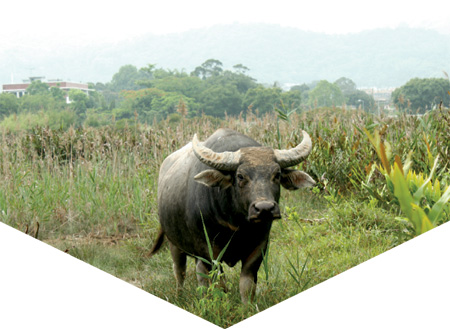Mui Wo's vanishing herd
Updated: 2011-07-08 06:36
By Doug Meigs(HK Edition)
|
|||||||
|
Water buffalo can weigh more than a ton, and the Agricultural, Fisheries and Conservation Department wants to relocate the Mui Wo buffalo to Mao Po Nature Reserve to guarantee another goring does not occur. |
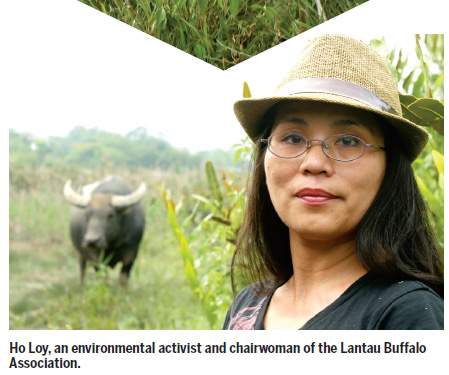
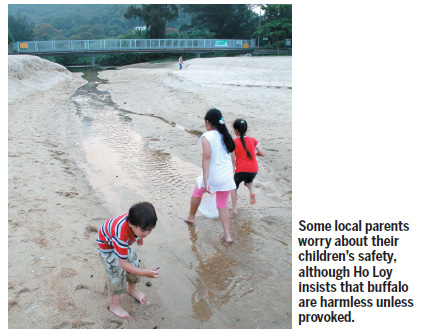
The government plans to relocate Mui Wo's last three water buffalo despite mounting criticism. Doug Meigs reports.
After a feral bull gored a tourist on Lantau Island in late March, the government decided to relocate the last of Mui Wo's water buffalo herd to the Mai Po Nature Reserve in New Territories. The moving day was set for May 17. It came and went.
Staff at the Agriculture, Fisheries and Conservation Department (AFCD) had problems. The tranquilizer darts didn't work. One of two animals darted wandered off into a swamp. The other became dangerously bloated. The department promptly canceled the operation.
Another date would be at least a month away though the move may be postponed indefinitely. Local animal-lovers are working hard trying to persuade AFCD to abandon the relocation. Government officials however say they are determined to carry out the move.
"Our intention remains for the animals not to stay, but go to Mai Po," said Dr Howard Wong, who became principal veterinary officer for the AFCD, shortly after the animal attack took place.
"We're a little bit flexible, because we obviously want all parties to be on board before we do it," Wong said. "We try to take into account people's wishes as far as the timing, but nothing has changed our minds yet. There's been a lot of interest and reluctance to the relocation, but I haven't seen any proposal that would provide a suitable alternative."
The Lantau Buffalo Association and AFCD will coordinate a de-sexing operation with hopes that the animals would become more docile. Wong said that the department will wait one month until the animals have recovered from surgery before continuing with the relocation.
Lantau Buffalo Association Chairwoman Ho Loy said Mui Wo has more than 40 hectares of unoccupied scrubland, more than enough for three buffalo to coexist with residents.
In addition to protests from residents who want the buffalo to stay, Wong said he also received complaints from Mui Wo residents who want the buffalo removed.
On March 26, a man was walking with his 3-year-old daughter on Silvermine Beach when a young bull charged him. The animal tossed the man into the air. The victim suffered leg injuries and was hospitalized. The child was not harmed. Wong said eyewitnesses reported that the tourist had not provoked the buffalo.
The Lantau Buffalo Association however had received complaints that teenagers were trying to ride the animals in the days preceding the attack. Ho said Mui Wo's buffalo were also under particular stress, because of construction projects within their wetland habitat.
"They are very shy, so if nothing happens, they'll just stay in the wetland area. They're normally peaceful and they respond slowly to mounting pressure," she said. Ho is aware of only one other buffalo attack during her time with the association. It occurred five years ago with Lantau's larger breeding herd of 30-plus buffalo in Pui O. She said beachgoers prompted the attack by throwing rocks at the animals.
The Mui Wo victim brought legal proceedings against the AFCD after the government had culled half of Mui Wo's herd, leaving only the present three animals. Wong said the man's complaint expressed a belief that the department should have removed the buffalo previously. A spokeswoman for Hong Kong's Justice Department said the case has not yet become a formal lawsuit.
The cull at Mui Wo took place on March 29, three days after the tourist was attacked. The government attempted to relocate one buffalo to an animal center in the New Territories. The chairwoman of the Lantau Buffalo Association was present. She climbed on top of a crane to prevent the department from removing the animal. AFCD officials on the scene threatened to hold Ho accountable for any injury to the animal if she didn't stop her protest.
"They were trying to get me off the truck, and I said, 'I can't because this animal will go to the landfill if I get off the truck.' But at the end of the day, that's where he ended up," Ho said.
During past relocation attempts, buffalo have died during transportation. One disastrous "relocation" in 2007 resulted in the death of 16 of 17 Lantau buffalo. Ho didn't want a repeat occurrence, but she eventually agreed to cooperate. The truck pulled out with the animal aboard. It died in transit. The AFCD euthanized two other buffalo because vehicles were unable to reach the animals across rough terrain.
Wong said buffalo have proven a public safety risk and the government would be held accountable in the event of future attacks. "The longer you keep three large bulls in Mui Wo, the more chance you have of another incident happening. Having found a great place to put them (in Mai Po), we would appeal to rational minds, that for the benefit of these buffalo, we should move them."
Although Ho hopes the castration operation will make the remaining three buffalo peaceful enough to pacify pro-removal interests, she praised the AFCD's efforts to arrange a relocation site in Mai Po Nature Reserve. The World Wildlife Fun manages the site. She said it offers an essential habitat for future relocations of aging or injured buffalo. Two buffalo currently live at the Mai Po Nature Reserve. Wong said the Mai Po buffalo have proven popular with tourists and beneficial for the ecosystem.
"A relocation site is something that we definitely need in Hong Kong. Not just for Mui Wo, but for all buffalo, because all of the wetland that we have is facing development threats. The buffalo is in danger of losing its habitat and losing its environment," she said.
Ho estimates that Hong Kong is home to fewer than 200 buffalo. Lantau Island is home to 63. The buffalo once used for plowing fields were abandoned by rural villagers during the 1970s when the agricultural industry declined.
Before the World Wildlife Fund expressed interest in hosting additional buffalo at Mai Po, AFCD animal control would seize any buffalo or cattle causing a public nuisance (blocking traffic or posing a safety risk). The animal would then go to an animal center, its presence would be advertised for owners to claim, and if no one came to claim the animal, it would go to auction. Wong said lack of adoptions or demand for buffalo meat inevitably resulted in the animals being euthanized.
"The policy change is that, if the animal is viable, we try to neuter or spay it and release it to a suitable area, if an area can be found," he said. "We do our best to relocate rather than sell them off. But obviously with a water buffalo it's more difficult due to its large size compared to a normal cow."
Ho said the Mai Po site would not be ready to accommodate Mui Wo's buffalo until November. Wong has arranged an intermediary holding area in the New Territories, but Ho said the site is unacceptable because it lacks the necessary wetland habitat.
A community news website (the Lantau Link) launched a petition that has garnered 400 signatures in support of keeping the buffalo in Mui Wo. Diane Stormont is a Mui Wo resident and journalist who founded the Lantau Link.
She is concerned that buffalo might not survive a relocation attempt and that relocation from Mui Wo could set a precedent for Lantau's other buffalo herds. Stormont is not a member of the Lantau Buffalo Association, but was involved with the association before it was officially established in 2004.
"Since the lawsuit (from the victim), everything seems to be on hold. Nobody seems to know what's going to happen," she said. "The danger is that once Mui Wo gets rid of our buffalo, Pui O will say, 'Hey they got rid of them, let's get rid of ours.'"
Living Islands Movement is another NGO concerned about Mui Wo's buffalo. The organization seeks to support sustainable development in Hong Kong's Islands District. John Schofield is the treasurer and a former board member with the Lantau Buffalo Association.
Schofield is hopeful that Hongkong Land Limited might help to establish a local nature preserve in Mui Wo. The real estate development company owns a substantial portion of wetland areas around Mui Wo. Living Islands Movement is preparing an official proposal in cooperation with other green groups. A potential reserve could provide a sanctuary for the buffalo.
"We have not made any formal proposals, and (Hongkong Land) is not the only land owner in the area," Schofield said. "We're hoping in due course to put together some sort of proposal for a wetland reserve in the Mui Wo area, but it will take some time."
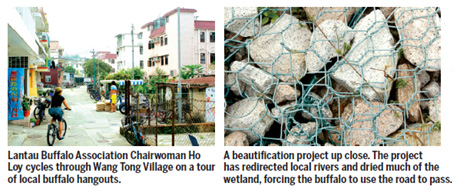
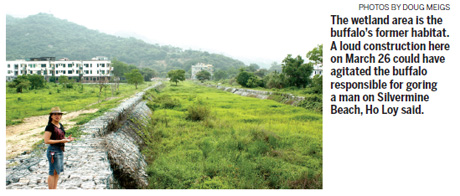
(HK Edition 07/08/2011 page4)
